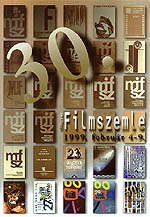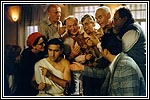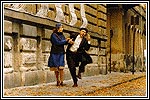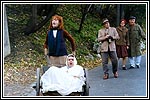 |
Vol 0, No 25 16 March 1999 |
| |
Crushing Defeats (Part I): Hungary vs England Peter Timar's 6:3 Andrew Horton When it comes to shaping a nation's perception of itself in relation to the rest of the world, sporting events can be just as powerful as political or military ones. Peter Timar's latest film 6:3 (1998) relives a defining moment in recent Hungarian history which revitalised national pride. In the 1998 World Cup, Iran took their defeat of the US to signify the moral superiority of Islam over decadent Western Imperialism; in the same competition, France's overall victory marked a turning point in the country's attitude to multiculturalism; and when Czechoslovakia humiliated the Soviet Union with a 4:3 defeat at ice-hockey not long after the Prague Spring had been brutally suppressed by the Soviet-led invasion, the Czechs and Slovaks were able to interpret their win in ways which went beyond the usual bounds of sporting achievement. Peter Timar draws on no less significant an occasion for Hungary: their 1953 crushing defeat of England at football.
Few Hungarians were in doubt that the nation was being unfairly punished for a war in which they had not wanted to fight. In the inter-war years, Hungary never lost sight of her aims of regaining her former territories and restoring the crown lands of St Stephen to their former glory. With Hitler controlling Germany, the balance of power which arose seemed to offer a chance of fulfilling these ambitions. Indeed, Hungary did, temporarily, regain a large part of her lost territories. With the defeat of the axis powers, Hungary was again truncated, and this time, all hope of a Greater Hungary died in the process. Despondent at the death of millions of individuals and the death of the dreams of a being powerful nation, Hungary sunk into the darkest years of its recent history -the unrelentingly harsh and repressive years of Stalinism.
The film's hero is the refuse collector Tutti, played by Karoly Eperjes (who bares more than a passing resemblance to Robert de Niro). On his rounds one day, he is offered some extra work, clearing the junk out of a young woman's house for 5000 forints. The "junk" in question happens to be the football memorabilia which her grandfather obsessively collected. The prize piece is a shirt worn in the legendary England-Hungary game. When Tutti tries it on, he is transported back in time to 25 November 1953. Not only is this the date of the football match, it is also the date of his birth and his day is spent rushing around Budapest trying to listen to the match on the radio and attempting to locate his mother, whom he never knew. (Timar, incidentally, dedicates the film to his own mother.)
Starting with the quotation "after all these times, the past always looks good," Timar aims to recreate the runaway success of his 1997 hit Csinibaba (Dollybirds), which attempted to evoke the pleasures and the pains of Hungary in 1962. Despite basing his story on highly promising material, Timar fails to pull the whole thing off and 6:3 has neither the wit nor the keen observation of his earlier film [Click here for a full Kinoeye review of Csinibaba]. Whereas Csinibaba derived its humour and power from being an improbable story with hilariously impossible musical interludes, Timar's time-travelling tale of football and somewhat Oedipal love has a ludicrously unbelievable plot with songs thrown in at all the logical moments - a fatal combination. 6:3 is certainly not without its good gags - the interrogation suspect who celebrates with his torturers, for instance - but the overall scenario is simply not as engaging and original as it could be.
Andrew J Horton, 16 March 1999 Click here to read Crushing Defeats (Part II), which recounts Hungary's less successful battle against Hollywood.
|
| |||||||||||||||||||||||
![]()
Copyright (c) 1999 - Central Europe Review and Internet servis, a.s.
All Rights Reserved




